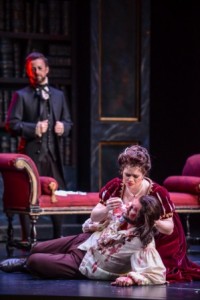Tosca: Opera Lyra continues in the right direction

One of my all-time favorite operas, Puccini’s Tosca, speaks to us, not only through some of Puccini’s most beautiful music and memorable arias, but also through the tale of tyranny and unrestrained lust in a turbulent time, which is so familiar to all generations. Based on Victorien Sardou’s dramatic play La Tosca, this timeless piece of art deals with the lowest and the highest aspects of human nature. Time-wise it takes less than two days – according to Sardou just between the afternoon of June17th and early morning of 18 June 1800. When the Kingdom of Naples’s control of Rome is threatened by Napoleon’s invasion of Italy, love, courage and political repression intertwine in 24 hours of harsh reality.
The historical background coupled with the fact that the action is set in three still existing Roman locales – act one is set in the Church of Sant’Andrea delle Valle, act two in the Palazzo Farnese, and act three in the Castel Sant’Angelo – bring this opera closer to reality than any other operatic work. Of course, the very contemporary construction of the story helps, as well. It has a movie-like flow: romantic introduction (Tosca’s entrance in the church in the moment when Mario Cavaradossi is helping a runaway political prisoner); thriller-like development (Tosca spots a knife and kills Baron Scarpia); and a tragic culmination (the betrayed promise of false execution and free passage out of Rome, which brings the death of two lovers).
There is a lot to be said about Opera Lyra’s interpretation of Tosca, and most of it is good. The beautifully designed set, along with the equally beautifully applied lights, gives a breath-taking frame for the drama taking place on the stage. As always, the orchestra carries the emotions and the atmosphere throughout the piece impeccably. Overall this production is mainly successful, regardless of some last minute problems (a replacements of the singer in the role of the Sacristan and the sudden illness of one of the singers). Thomas Hammons, who appears as the Sacristan, proved to be a valuable addition, and not only because of his exquisite singing. He is definitely the best actor of this production. The depth and richness of his portrayal of the Sacristan makes his character natural and funny. Another well-rounded character is Baron Scarpia, as sang by Todd Thomas. In his rendition, the corrupted chief of police becomes the very idea of a dirty, unscrupulous, scheming man in power during dark times – sweating in moments of lust and executing his wishes in a cold, sadistic manner.
The first act was not promising, except for the Sacristan’s short but exceptionally well-executed role. The two principal characters Michele Capalbo as Floria Tosca and David Pomeroy as Mario Cavaradossi sing beautifully, but they definitely need some lessons in acting. The chemistry between the two lovers is missing. Capalbo is too passionless for a jealous artist who lives (and dies) for art and love, while Pomeroy as Mari Cavaradossi often sings to the audience instead to Tosca. This makes the love scenes flat and lacking in the feeling of tenderness, love, anxiety, and impatience.
The second act was better. Some moments are well captured and some feelings conveyed more realistically. Although Capalbo’s Tosca is not the strong, fearless woman that she could be, she shows some vulnerability. Again, in the powerful moments of her utmost despair she sings her anguish to the audience as if she were singing at a concert instead of in the opera.
The third act is absolutely beautiful. For the first time, there is chemistry between the two lovers. They are absorbed in a real embrace and the hope of freedom is in the air. Guy Montavon resolves the end in a very interesting way – Tosca shoots at the guards, causing them to shoot her instantly. That gives a chance to Michele Capalbo to be Tosca: a strong, fearless, intuitive artist who lives and dies by the principal of love.
Opera Lyra’s production of Tosca is not perfect, but still, it had some powerful moments, strong enough to make it a pleasant night in the theatre. Overall, I believe that Opera Lyra is on the right track again.
Tosca
By Giacomo Puccini
Libretto by: Luigi Illica and Giuseppe Giacosa
Production: Opera Lyra
Cast
Floria Tosca – Michele Capalbo
Mario Cavaradossi – David Pomeroy
Baron Scarpia – Todd Thomas
Angelotti/Jailer – Giles Tomkins
Sacristan -Thomas Hammons
Production Crew
Conductor – Tyrone Paterson
Stage Director – Guy Montavon
Chorus Master – Laurence Ewashko
Children’s Chorus Leader – Jamie Loback
Repetiteur – Judy Ginsburg
Stage Manager – Kelly Luft